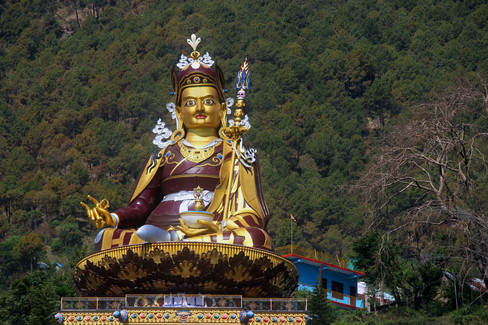Peace, Without the Hashtag: The Monk and the Mirror
- Guste Vaitkeviciute
- Jun 16, 2025
- 15 min read
Updated: Sep 17, 2025
Meeting a Buddhist monk was not life altering – except that it was.

Places – placement – displacement
Years ago, I started chasing the idea of elsewhere. I lived in multiple places, explored different lifestyles, crossed paths with diverse cultures and communities. I've met people who easily found peace of heart in a certain place – be it their homeland or a foreign country where they migrated and felt a sense of belonging – and people who, like me, wander ceaselessly around all corners of the world and fill their hearts with landbeat slowly, gathering pieces of something dear in every place they visit. Curiosity pulled me forward, long after I forgot what I was looking for. And then, in Rewalsar, I met Yeshi Dawa – a man who had stopped chasing.
For a while, I've been locked in a heated debate with myself, thinking whether we have the right to tell stories of other lands, home to other cultures. One side of me kept holding back, afraid of getting it wrong – through mistakes, misleading narratives, unintentionally uncovered secrets. Afraid my words might offend those whose stories aren't mine to tell. Meanwhile, the other side insisted that perhaps, if spoken humbly, these words would mend the world from isolated pieces, and perhaps, through binding them together, would make it feel like a slightly less intimidating home for all. So here I am, telling the story of my encounter with one little town hidden in a valley of the Indian Himalayas – the place that impacted my life through invisible touches and made me wonder: do we really chase new places to find answers – or to forget the questions we're too afraid to sit with? Here, in Rewalsar, the idea that places have the power to seep into us and shape our longings began to haunt me. And that thought hasn't stopped following me since.
Up the hills
I came to Rewalsar early in the morning, accompanied by a friend. A ten-hour bus ride from New Delhi, winding through four hundred kilometers of high traffic roads. The bus driver let us out in a small village five kilometers away from our destination where we waited for a local bus that would bring us to Rewalsar. Ten minutes. Fifteen. Twenty... The sky opened into a gentle rain, and there was no bus in sight. We decided to walk.
After a week spent in the chaotic hum of Indian megalopolises, the rainy mountain road immediately felt refreshing, like a reset. The apparent vastness of space between people and objects, the silence of mist-covered hills, and the cool mountain air was a welcome contrast to the dense heat of the cities, a salve to my senses overheated with visual and auditory stimulation. Fifteen minutes into our walk, the bus finally appeared on the bumpy road behind us. Grateful to escape the growing downpour, we climbed aboard and squeezed among local students in neat school uniforms. Their curious glances lingered on me – my Western appearance, tattoos and piercings a rare sight around these small towns, far from the usual tourist destinations. The area is not tourist free, but the crowds of strangers are definitely smaller here than in the bigger cities, and many of the locals have never seen a Western intruder.

There was nothing in particular that I expected to find in Rewalsar – I only wished to discover places and faces away from India's well-trodden touristic paths, places where the flow of life is slow and people stop to share bits and pieces of their everyday life. And still, after days of navigating the bustling cities, I found a pleasant surprise here: a small town with no major tourist attractions, where local residents quietly went around their day. Monks in purple-yellow robes circled the lake, the scene unchanged hour after hour, day after day.
Rural life has always intrigued me through its quiet, almost timeless rhythms. There's a kind of mystical wisdom in these places, passed down through generations and carefully protected by traditions and memories of the locals. Rewalsar, hidden among the mountains of Himachal Pradesh, proved to be exactly that. The town radiates a palpable energy, a mix of the spiritual and the material, a peaceful introspection and a hint of chaos. It was here that I understood what people meant when they told me that in the chaos of India, one could find peace once they surrender.
Here, the threads of three religions – Buddhism, Hinduism, and Sikhism – intertwine, each leaving its mark on the tranquil landscape through their legends and rituals. At the heart of the town lies its sacred lake, a living symbol of both religious heritage and the town's changing face. Many stories and legends about sages and gurus of all three religions revolve around this lake, echoing through the town's numerous temples and monasteries – including a shrine to Mandarava and a Gurdwara – all nestled in the surrounding hills.
Through the open windows of a monastery room where I was staying, I could still hear dogs barking and cars passing on the street. And yet, despite this, Rewalsar holds a kind of peace that stands in contrast to the frenetic energy of the cities I've known. The noise of urban life began to fade here, giving way to the gentler sound of my own thoughts.
With no big tourist attractions around, observing locals became my attraction in itself. Monks, street cooks, gurus, jewelers, vendors, yogis, passersby in colorful clothing... Being surrounded by an incredible diversity of stories I knew nothing about, I wanted to get closer to just one little bit of this whole mosaic. In fact, I remembered the reason for leaving home in the first place: to learn about the world through new perspectives while meeting people – face to face, heart to heart – unlike anything I knew before. People who embody diverse lifestyles and everyday philosophies, those who are real faces of unknown places. Now, I finally found myself seeking a company not of fellow travelers, but of someone local – someone who wore the spirit of this place like their second skin.
Aware of the town's spiritual significance, I hoped to speak with a practitioner of one of its main religions. My intuition led me toward Buddhism, perhaps influenced by the books of Hermann Hesse – especially Siddhartha, of course – or the riveting philosophy of Alan Watts. The reason? Curiosity. You see, when thinking of Buddhist monks, I had always imagined them as distant figures – silent, meditative, inaccessible. Someone to be worshiped from afar. I wanted to break this mental barrier, to know the mind of a Buddhist monk – not his views on the grand narratives, not his revelation of truth, but to understand what he is at his heart, as a human being.
And so, one slow afternoon, I gathered my spirits and went on a mission to find a monk. After wandering through the town's temples – all closed or tucked away in the hills with pathways that mysteriously stopped halfway up – I eventually found myself on top of the hills. I was standing by the town's largest and most elaborate temple, with a towering statue of Padmasambhava ('Born from a Lotus'), also known as Guru Rinpoche ('Precious Guru'), overlooking the lake. There, I met Yeshi Dawa, the head guru of the Buddhist community of Rewalsar, after his evening prayers. We sat at a café at the foot of the temple and talked until sunset.

Yeshi Dawa offered me coffee while he made chai for himself. I felt welcome.
As we sat, he shared his journey from Ladakh, where he grew up, to Rewalsar. At the age of eleven or twelve – he's not entirely sure – his mother's friend suggested he consider becoming a monk. For the young Yeshi Dawa, it wasn't a conscious decision – more of a child's curiosity for travel and adventure far from home, not yet realizing what kind of life was at stake. It was only after arriving in Rewalsar, after a night-long journey, that he began to grasp the path ahead. He was shown to the Buddhist institute, where his hair was cut, a new name given, and monastic life on the way to be fully embraced.
Ten years – that's how long monastic studies take, immersing young monks in the intricacies of Tibetan language, Buddhist philosophy, and sacred pujas (prayers). A testament to this dedication, Yeshi Dawa's current daily routine is simple yet disciplined: rising at dawn, praying for an hour, cleaning the monastery and nearby café, and balancing rituals, teaching, study, and community life.
Through these practices, Yeshi Dawa finds a deep sense of fulfillment, believing that Buddhism provides a unique peace and happiness that secular society's pursuit of material success often lacks. For him, it's a refuge from the chaos of the outside world, helping to focus on spiritual growth and the promise of a better upcoming life. A stark contrast to the relentless pursuit of material goals that characterizes the modern spirit, the lifestyle of simplicity brings contentment in a way that most of us never quite reach. And it stems not from having less, but from needing less.
If in his childhood he wasn't sure what a monk's life is about, Yeshi Dawa is now certain: satisfaction in simplicity. Seeing how people in the outside world suffer and struggle over numerous worries makes him appreciate how peaceful his own life is, although he's aware of the earthly joys, too. Yeshi Dawa sees people getting married and starting families, buying houses and cars, going abroad and having adventures. One would think – doesn't he dream of having all this one day, too? Doesn't he... secretly wish he weren't a monk? For next to all the worries, there are many pleasures, too. He has witnessed about three hundred monks retreating from the monastic life after connecting to the outside world. Nowadays, he says, social media makes it so much easier to see secular life up close. It's so much more on display, and so much more tempting than ever. Despite all this, for Yeshi Dawa there's no regret – not because his lifestyle is easy, but because it's enough.
The measure of a modest life
The head guru of Rewalsar's Buddhist community showed me a side of monkhood I hadn't expected – one where connection is just as central as renunciation. Within the walls of the monastery, he has formed deep bonds with fellow monks, sharing the joys of festivals, communal meals, and even light-hearted cricket matches on weekends. This collective lifestyle brings him immense joy, as they clean and decorate the monastery for festivals, celebrate together, and tackle even the hardest tasks with a playful spirit. Special days are marked by group cooking sessions, where everyone gathers around the meal, takes photos, and relishes the warmth of shared experiences. This communal lifestyle and teamwork, Yeshi Dawa says, is what fulfills him most – reminding me that no matter how profound meditation or detachment may be, human connection is essential for peace and happiness. We need others to thrive.
Life outside the monastery, however, presents a challenge. While Yeshi Dawa speaks nearly ten languages, connecting easily with monks from across India and beyond, the local Himachali dialect remains elusive to him. This language gap often makes it difficult to build deep connections with the surrounding community. Hindi, though helpful, isn’t native to the region, leaving the monk feeling slightly detached from the broader life of Rewalsar.
Solace remains in simple pleasures, shared through strong bonds with fellow monks. Every evening, as the sun sets, they take long walks around the lake, engaging in conversations that sometimes last until 1 a.m. These strolls, filled with laughter and reflection, offer a peaceful close to their day. Yet no matter how late the conversations stretch, they always rise by 5:30 a.m. for their morning puja, staying committed to their disciplined routine while still savoring the warmth of their connections.
When I asked Yeshi Dawa what struggles he faces in life, he paused, contemplating. Not many. He remembers the typical hurdles of any student he had faced while studying at the institute: struggling with certain subjects while excelling in something else, finding motivation to study some things more than others. Now, as a monk, he doesn't face any economic hardships or personal turmoil. His only worries lie with his family's struggles which inevitably become his own. Though miles apart, their challenges still weigh on him, and his love for his family makes their challenges feel personal.
It was at that moment I realized the monk's spiritual superiority over me. When someone's greatest worry is not their own but another's, I know I have a long way to go to be even halfway like them.
The guru's ability to live worry-free is rooted in Buddhism's idea that many struggles are self-imposed, often born from unnecessary comparison with others. “We invite those problems into our lives,” he explained. “Not all the problems actually exist on their own – they come from other people's words or by taking on burdens that are not ours to carry.” The solution, he suggests, is emotional distance, and his example – to my surprise – is travel.
In the Western world, travel is often seen as an escape – from oneself or from responsibilities – despite the fact that many people choose it as part of their lifestyle. But the monk offers a different view: travel can clear the mind and provide new perspectives on the world. It's true though, he admits, that it only works its positive magic for those who can leave emotional baggage behind. For those unable to detach, travel may do more harm than good. In such cases, he advises meditation as a way to create the emotional distance needed to return to one's community with a sense of peace, free from unnecessary burdens, especially those created by societal expectations or the opinions of others.
Most important, he reminds me, is to focus on what's within our control and let go of the rest. Sure, that won't solve all the world's problems or save the world itself, but it may help us stay steady in the middle of them.
Still, for all the monk's peace, I found myself wondering. Is everything really so simple, so effortless for him? Could life truly be without struggle? At first glance, the life of a monk seems easy, free from the responsibilities most of us are familiar with. As if listening to my thoughts, Yeshi Dawa explained that his peace is the result of discipline. He doesn't avoid distraction or temptation – he actively controls it. His immense discipline is the quality that reflects in his life of prayer, meditation, and teaching, all a conscious choice to isolate himself from distractions and earthly desires. The difference between him and myself – most of us, really – is not that he's immune to temptation, but that he's mastered the art of self-control.
I was curious whether it's possible to ever find balance between a material, secular life, marked with goals and ambitions, and the same peace and spiritual fulfillment that he's achieved. Yeshi Dawa's response was the story of two Buddhas:

Siddhartha Gautama was a prince who had everything: a wife, an elaborate palace, money, power. Yet he left everything behind and went to the forests to seek enlightenment. Eventually, he became the Buddha – the awakened one.
Often referred to as the second Buddha, Rinpoche Padmasambhava was just like him – spiritual and enlightened – but his life was the complete opposite. He had two wives, held diplomatic relationships, used to sit together with kings and talk to people in their family environments. Buddha took the hardest path, and Rinpoche Padmasambhava showed a path to embodying both worlds at the same time. Enlightenment doesn't necessarily require renouncing the world – it only compels one to know where in life to place material desires.
Once again Yeshi Dawa pointed to meditation as key, noting that Rinpoche Padmasambhava had eight different personalities, each embodying a different emotion – anger, peace, joy, and others – that would come forward when needed. He could be a fierce warrior, an enlightened man with the third eye, or a dancer. Switching between these selves was made possible through the power of meditation, for in that state, detachment doesn't mean disconnection – one can be fully engaged with the world and life's circumstances, yet remain unbound.

This balance between the material and spiritual worlds is well known to Yeshi Dawa personally. Ambitions, one of the hallmarks of secular life, are often but another source of struggle and pain, the monk says. Despite that, he admitted having one himself, too – a reminder that, at the end of the day, he's also human. Education has been a cornerstone of Yeshi Dawa's monastic journey. After a decade of studying Buddhist teachings, Tibetan language, and other disciplines, he emerged not just as a monk, but as a teacher, imparting knowledge to younger monks. His further goal, like many in the monastery, is to become a khenpo – a teacher of profound wisdom and discipline. At the same time, as he points out, it's a goal to live a simple life without thinking too much.
Different stages of monkhood are marked by key vows. The first vow, taken by young monks upon entering the institute, signifies their departure from civilian life and their commitment to study and spiritual growth. Many of these monks, like Yeshi Dawa, become teachers of the next generation. Later, when they're ready, monks face an even more challenging vow: renouncing all worldly temptations, such as alcohol, drugs, sex, and all other addictions. Breaking this promise comes with dire consequences – it is said that the violator is condemned to hell with no chance of forgiveness. Yeshi Dawa hasn't taken this vow yet. He admits that the weight of such a commitment scares him. For now, he's content with his current role, living at the monastery near Rinpoche Padmasambhava's temple, balancing his spiritual duties with a personal exploration of whether this path is truly his.
Yeshi Dawa is aware that the inevitability of sinning runs through all of us, vows or no vows. It dawns on us in small, unintended and often unnoticed ways, such as accidentally killing an insect. In Buddhism, there are rituals of atonement for these involuntary acts, such as prayers for forgiveness on the nights of the full moon. The connection between religious practices and the moon cycles is deeply rooted in Buddhism, as the moon is believed to influence human energy and meditative powers, all rising and decreasing in sync. It’s no coincidence, he notes, that people often experience heightened emotions or greater problems during full moons – a belief that resonates in Western culture as well.
Beneath stillness
While I kept moving – between countries, goals, questions – he stayed. Not out of fear, but out of choice. Discipline. At 32, Yeshi Dawa has called Rewalsar home for over two decades, and witnessed its transformation firsthand. He recalls a time when the town was quieter, fewer houses dotted the landscape, and the lake was cleaner. Over the years, pollution has worsened, and the expansion of housing continues to creep into the landscape. The monk worries that the forest, which once framed the town, may soon disappear, replaced by even more buildings. The lake – once a sacred body of water, shimmering with an oily sheen, a relic of the burning of Rinpoche Padmasambhava in olden times – has suffered greatly. Around 2016, pollution levels were so high that fish began to die, their dead bodies occasionally washing ashore – a grim reminder of the environmental toll.
In the face of the town's ongoing transformation, Yeshi Dawa draws comfort from the Buddhist principle of karma. Instead of dwelling on the negative, he focuses on his own positive actions, believing that the results of his efforts are in the hands of the divine, trusting that the next incarnation of Buddha will guide the world back to balance. “The world will always face challenges,” he says, “but fixating on them only robs us of peace of mind.” He advocates for focusing on what’s within our control: contributing positive actions, living simply, and trusting that balance will be restored in its own time.
Yeshi Dawa remains deeply connected to Rewalsar. While he acknowledges that Ladakh, his homeland, offers greater peace and is home to monasteries thousands of years old, it is Rewalsar's spiritual and historical significance that keeps him rooted. The town, with its historical ties to Rinpoche Padmasambhava, provides a unique sense of home that he wouldn’t find elsewhere – one rooted in tradition and community.
Rewalsar became my special space of meditation as well. It offers numerous Buddhist caves, lakes, and trekking paths all around the town for those uncomfortable with stillness. I, however, couldn't force myself to explore. For four days, I simply sat – at the lake, monasteries, cafés overlooking the town. No exploration, no reading, no creation. Time passed so quickly I barely noticed.
The city itself invited me to slow down through its timelessness, shaped by centuries of devotion, quiet evening rituals of lighting candles in the monastery yard, and turning prayer wheels with monks I met among the town's streets. I didn't want to leave. I didn't want to face the chaos of cities, or the input of new places, new faces, new information. I only wanted to be there and then – or, here and now.
It wasn't an easy stillness. In the days following our conversation, I found myself wrestling with a restlessness I hadn't anticipated. Instead of calm, there was a newly unearthed tension between goals with a desire for control, and surrender. Tension. Would it eventually adjust these opposing forces for harmony?
Fears, insecurities, and the uncomfortable truth that I was the one responsible for my dreams – Yeshi Dawa spoke of detachment from outcomes and self-imposed worries, yet I kept questioning whether I was doing enough – or being enough. His words challenged my drive to achieve, but deep down I knew he was right: the peace I sought would come from releasing the grip of control. Here stared the paradox into my soul: we need so little to be satisfied, yet attaining that simplicity often demands immense discipline and conscious effort.
Through the story of Yeshi Dawa, through the meditative aura of the town, I was finally able to look straight into the full presence of my thoughts until I couldn't deny them anymore, and couldn't run away from them. Before I came here, I already knew what I wanted in life, and what fears held me back. Now I also saw what had been missing: action. Taking responsibility for what's within my control, and letting go of the rest. That was my longing that fully took shape in Rewalsar: balance.
Here, I began to sense how such places – quiet, small, and unhurried, where you can sit with yourself undisturbed – create space to confront the parts of ourselves we often shy away from. It's too uncomfortable to look at them, and getting rid of them requires work. But peace isn't hidden in stillness alone – it's in the chaos we carry inside our hearts, waiting to be met with the courage to face it.

The monk didn’t offer me profound revelations or secrets of the universe. Instead, what struck me was how down-to-earth he was, deeply connected to his environment. When he asked me if his words resonated with me, I had my reassurance that he didn't position himself as a source of enlightenment beyond my reach, but as an equal grounded in the same human experiences. The only difference, it seemed, was that everything that I knew in theory, he embodied – he was a living example of contentment with simplicity, something many of us talk about but rarely commit to. What we like to preach through polished captions and framed digital composure, he actually lives by.
After months of our encounter, Yeshi Dawa's beliefs still linger in my mind: we must practice discipline, we must try, and then release. As if I had been given a mirror, and I keep looking at it.

After I left Rewalsar, I visited a temple in New Delhi known for a statue of a holy cow that supposedly grants wishes whispered into its ear. Standing before the cow, I whispered my wish, and I knew, as I spoke, that it was not the cow that would make my wish come true. It was me.









































